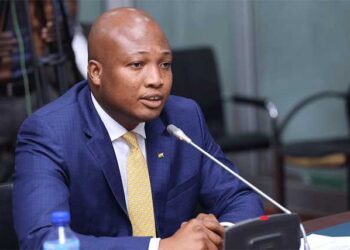Governor of the Bank of Ghana, Dr. Johnson Asiama, has stated that he is under no pressure to unilaterally reinstate the licences of banks that were revoked during Ghana’s banking sector cleanup.
Speaking at the 125th Monetary Policy Committee (MPC) press conference in Accra on Wednesday, July 30, Dr. Asiama responded to a question from Citi Business News’ Nerteley Nettey Adjaho, clarifying that any such decision would have to follow due legal and institutional procedures.
“Not at all,” Dr. Asiama said when asked whether he felt pressured to restore the licences. He further explained that the reinstatement of any bank’s licence cannot be a unilateral decision by the Governor but would require a court directive and the involvement of the Bank’s board.
“Remember, the resolution framework is working. I came into office to find that a lot of progress had been made. Some cases are in court, some cases are undergoing certain forms of settlement, and so the process is on, and we will follow up on the process in that regard,” he added.
He further clarified the procedure for any potential reinstatement:
“With the issue of what to do, it depends. For example, if a court reaches a decision and instructs us to go in a particular way, the board of the Bank of Ghana will look at that. But from where I sit, there is no pressure on me to restore any such unilaterally.”
The question followed a campaign promise made by President John Dramani Mahama during the 2024 general election period.
While delivering his acceptance speech at the University of Development Studies on May 15, 2024, after securing the NDC’s presidential nomination, Mr. Mahama declared:
“We shall promote robust, local participation in our banking and financial, telecommunication, tourism, mining and agric and manufacturing sectors to grow our economy and create sustainable employment for our youths.”
The banking sector cleanup, initiated in 2017, saw the central bank raise the minimum paid-up capital requirement from GHS120 million to GHS400 million; a move that led to the collapse or consolidation of institutions that failed to meet the new threshold.
In total, nine local banks, 23 savings and loans companies, 347 microfinance institutions, 39 finance houses and 53 fund management firms lost their licenses.
Collapsed banks included: UniBank, The Sovereign Bank, The Beige Bank, Premium Bank, The Royal Bank, Heritage Bank, Construction Bank, UT Bank and Capital Bank.
While the BoG defended the move as necessary to strengthen the financial sector, critics argued that several of the affected banks could have been salvaged to preserve jobs and local ownership.







